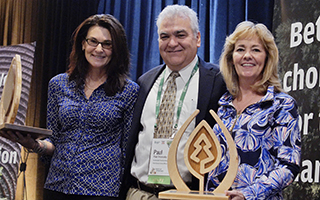
Their work engaged a wide range of SFI‑certified organizations to enhance biodiversity in accordance with best practices outlined in the SFI standards and quantified by the SFI Conservation Impact Project. The Conservation Impact Project is focused on measuring the benefits on lands which adhere to SFI standards relative to enhancing biodiversity, water quality, and carbon sequestration across the almost 370 million acres/150 million hectares of SFI‑certified forestland in the U.S. and Canada.
“Williams and Hamilton were instrumental in the early success of the SFI Conservation Impact Project and they continue to provide invaluable leadership today. The ability to make data-driven links between SFI standards and environmental impact gives SFI-certified organizations a powerful tool to tell their story with stakeholders and customers who care about the environment,” said Kathy Abusow, President and CEO of SFI Inc.
“We knew the SFI standards were making a difference in specific places, but we wanted to involve multiple SFI‑certified organizations at a meaningful scale to measure the wider impact. We used an SFI Conservation Grant to support a project in partnership with 10 SFI‑certified organizations and technical partners. We focused on the conservation value of SFI-certified forestlands in providing habitat for a number of declining bird species,” Williams said.
The project focused on birds of conservation concern including Swallow-Tailed Kite, Brown-Headed Nuthatch, Wood Thrush, Swainson’s Warbler, Prairie Warbler, and other species at risk. Just one of the important findings showed that a single study area on SFI-certified lands in North Carolina provided suitable breeding habitats for 72 different bird species, including as many as 59,000 Prairie Warblers. All of these species have experienced declines over the last few decades, leading to concern over the health of their populations. The study helped clarify the potentially critical role that sustainably managed forests can play in reversing the loss of these, and other, birds.
“This early success set the stage for other key conservation projects at multi-million-acre scales. Williams and Hamilton used their considerable communications and scientific skills to help meet this challenge and expand our understanding of the conservation impact on lands affected by SFI’s standards,” said Paul Trianosky, SFI’s Chief Conservation Officer.
“With support from SFI, our research has developed metrics to assess how SFI‑certified forests are performing relative to biodiversity at multiple scales, including threatened species, unique habitats, and landscape resilience,” Dr. Hamilton said. “Our project benefitted from active collaboration of many SFI program participants, who provided essential data that made these analyses possible. Our conservation metrics work brings increased transparency to the biodiversity values of SFI-certified forestlands.”
The study, which covered millions of acres in the U.S. Southeast and Pacific Northwest, showed, for example, that over 155,000 acres/62,700 hectares of habitat for gopher tortoise are on SFI‑certified lands in Florida. The gopher tortoise is listed as threatened by the U.S. Fish and Wildlife Service. Other rare species are similarly benefitting from the use of these forests throughout the study areas.
“Healy negotiated directly with SFI-certified organizations to gain access to spatial data and forest condition information that could inform the project and help make it scalable. Healy’s ability to navigate and move those negotiations were absolutely critical,” Trianosky said. “She worked with eight SFI-certified organizations, who were able to show how SFI standards support biodiversity at large scales.”
American Bird Conservancy: Managed Forest for the Birds
Organizations Certified to SFI- Campbell Global, LLC
- Enviva, LP
- Forest Investment Associates
- Hancock Forest Management
- International Paper Company
- Molpus Woodlands Group
- Rayonier
- Potlatch Forest Holdings Corporation
- Resource Management Service, LLC
- The Westervelt Company
- Weyerhaeuser NR Company
- National Council for Air and Stream Improvement, Inc.
- Avian Research and Conservation Institute
NatureServe: Measuring the Conservation Value of SFI-Certified Forests
Organizations Certified to SFI- Green Diamond Resource Company
- Hancock Forest Management
- Molpus Woodlands Group
- Port Blakely Tree Farms, L.P.
- Rayonier
- Resource Management Service, LLC
- Sierra Pacific Industries
- Weyerhaeuser NR Company
ABOUT SFI
The Sustainable Forestry Initiative® (SFI) advances sustainability through forest-focused collaborations. We are an independent, nonprofit organization that leverages four interconnected pillars of work: standards, conservation, community, and education. SFI works with the forest sector, conservation groups, academics, researchers, brand owners, resource professionals, landowners, educators, local communities, Indigenous Peoples, and governments. Collaborating with our network, we leverage SFI-certified forests and products as powerful tools to help solve sustainability challenges such as climate action, conservation of biodiversity, education of future generations, and sustainable economic development.
MEDIA CONTACT
Christine Leduc
VP, Communications and Government Relations
Sustainable Forestry Initiative
613-706-1114
media@forests.org
